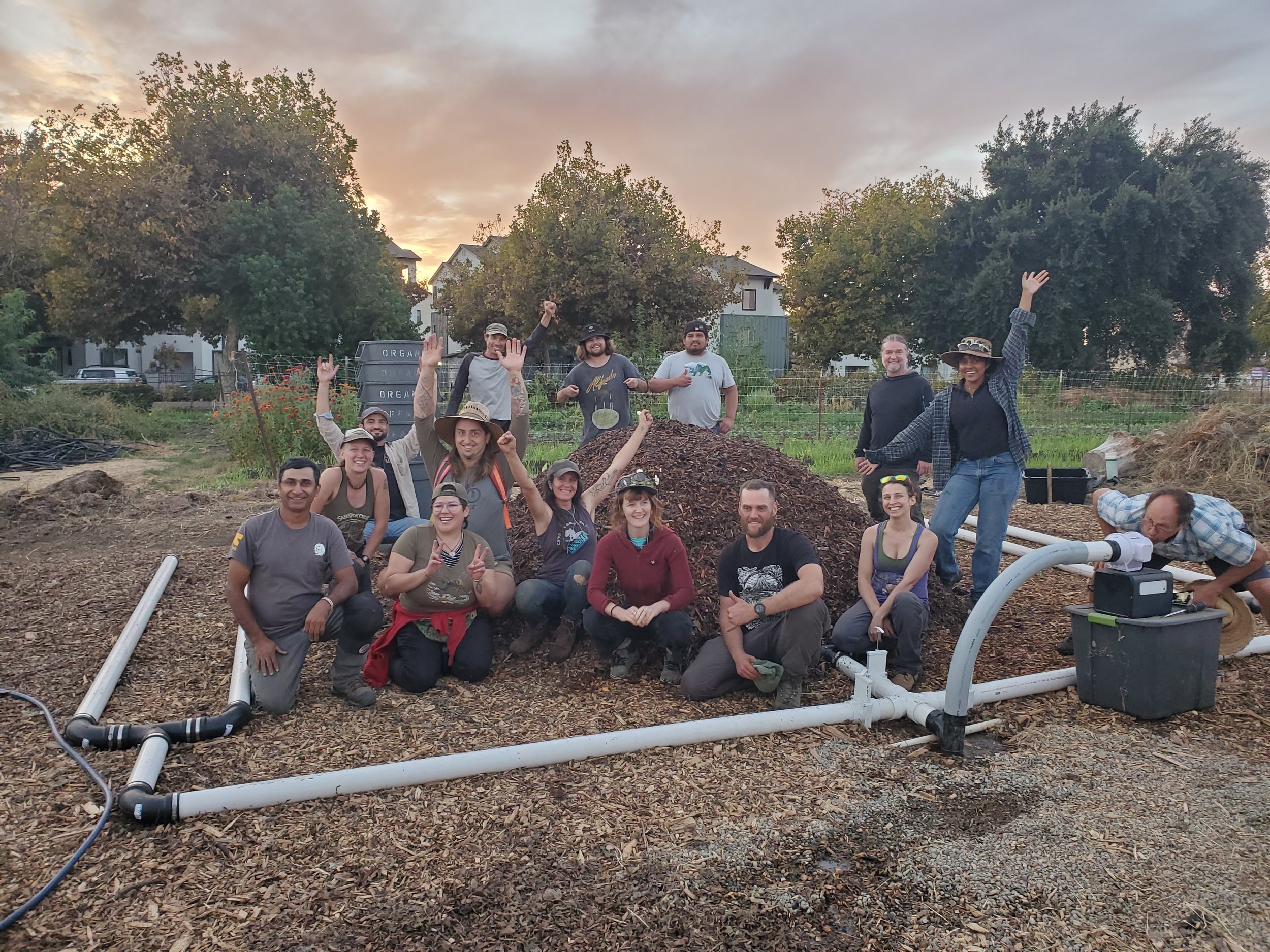California Department of Resources Recycling and Recovery’s (CalRecycle) Community Composting for Green Spaces Grant Program is funding community composting at hundreds of sites across California. In the first cycle of funding, the grant program awarded $1.5 million to the People, Food, and Land Foundation, which supported community composting at 117 sites throughout California, planted 488 trees, created 4,418 cubic yards of compost, and reduced emissions by 2,508 MTCO2e of GHG emissions. An additional $4.2 million was awarded to the California Alliance for Community Composting and LA Compost in the second cycle of the program. Through the establishment or expansion of community composting sites, communities receive benefits such as part time jobs and training on composting practices, fresh produce from adjacent gardens, training on farming practices, an increase in shade from tree planting, and the development of green spaces.
Hoopa Valley Tribe Brings Fire Back to the Land
In the Hoopa Valley Tribe’s homelands, California Climate Investments funding is helping the Hoopa Valley Tribe re‑introduce fire to an important oak woodland ecosystem. The work is supported by a $1.36 million grant from CAL FIRE’s Forest Health Program. The eastern side of the Hoopa Valley, on the current Hoopa Valley Reservation in what is known today as Humboldt County, has historically been home to extensive oak woodlands. Fire has always played an important role on this landscape—the people burned the hillsides for generations to maintain the oak trees and promote growth of other culturally important plants.
Ambitious Partnership Delivering the Next Generation of Old-Growth Redwood Forests
Old‑growth redwood forests store more above‑ground carbon than any other forest type on Earth. Unfortunately, only 5% of old‑growth redwood forests survived extensive colonial logging in the 19th and 20th Centuries. Now, thanks in part to California Climate Investments funding awarded through CAL FIRE’s Forest Health Program, a partnership is working to establish the old‑growth forests of the future on California’s northern coast.
Kick-Starting Zero-emission Fleets and Expanding Transit on California’s North Coast
With funding from the California State Transportation Agency’s Transit and Intercity Rail Capital Program, the Humboldt Transit Authority will procure eleven fuel cell electric buses for use throughout the North Coast and build the northern-most hydrogen fueling station for public and bus use in California. This project will also create a new intercity transit service to connect local riders from Eureka to Ukiah and points south, including the San Francisco Bay Area, with fuel cell electric buses.
Improving Forest Health in the Yurok Community Forest and Salmon Sanctuary
The Ocean Ranch Restoration Project
California Department of Fish and Wildlife
The California State Coastal Conservancy is restoring wetlands at Ocean Ranch along the Eel River with support from a $2 million grant from the California Department of Fish and Wildlife’s Wetlands Restoration Program. The Eel River was once one of the Pacific Coast’s greatest producers of salmon and steelhead. Over the years, extensive human activities have reduced the Eel River Delta. As the estuary shrank, so did populations of salmon and other native species, and carbon sequestration rates. At the same time, non-native species proliferated.
Reducing Fire Risk Through Hands-On Training Opportunities
The California Conservation Corps, a state department within the California Natural Resources Agency, uses funds from California Climate Investments to complete projects aimed at reducing greenhouse gas emissions across California. These funds target forest health projects, especially fuel load reduction where dead and dying trees, brush, and vegetation are removed to reduce wildfire intensity and rate of spread. The McKay Community Forest Fuel Reduction project provided skilled labor to Humboldt County to minimize fire danger near communities on the southeastern edge of the City of Eureka.
Tribal-Led Project Brings Affordable Housing and Sustainable Communities to Arcata
With the help of technical assistance providers funded by the California Strategic Growth Council’s California Climate Investments Technical Assistance program, Arcata 30th Street Commons became the first tribal led project funded by California Climate Investments through the Affordable Housing and Sustainable Communities program. The project, proposed by the Yurok Indian Housing Authority, earned a $11.4 million award and exemplifies how a strong vision, combined with partnership, technical assistance, and investment can help transform an under resourced community.
North Coast Resource Partnership Plans for Forest, Watershed, and Community Health
The North Coast Resource Partnership is a unique coalition of North Coast Tribes and seven counties that represent the North Coast and Klamath/Interior Coast Ranges ecological regions, both of which are important carbon storage areas in California. To help protect the health of forests in this territory, the North Coast Resource Partnership is using $4,037,500 of California Climate Investments funding through the Regional Forest and Fire Capacity Program to develop a regional priority plan that will generate implementation‑ready projects and provide funding for demonstration projects.












